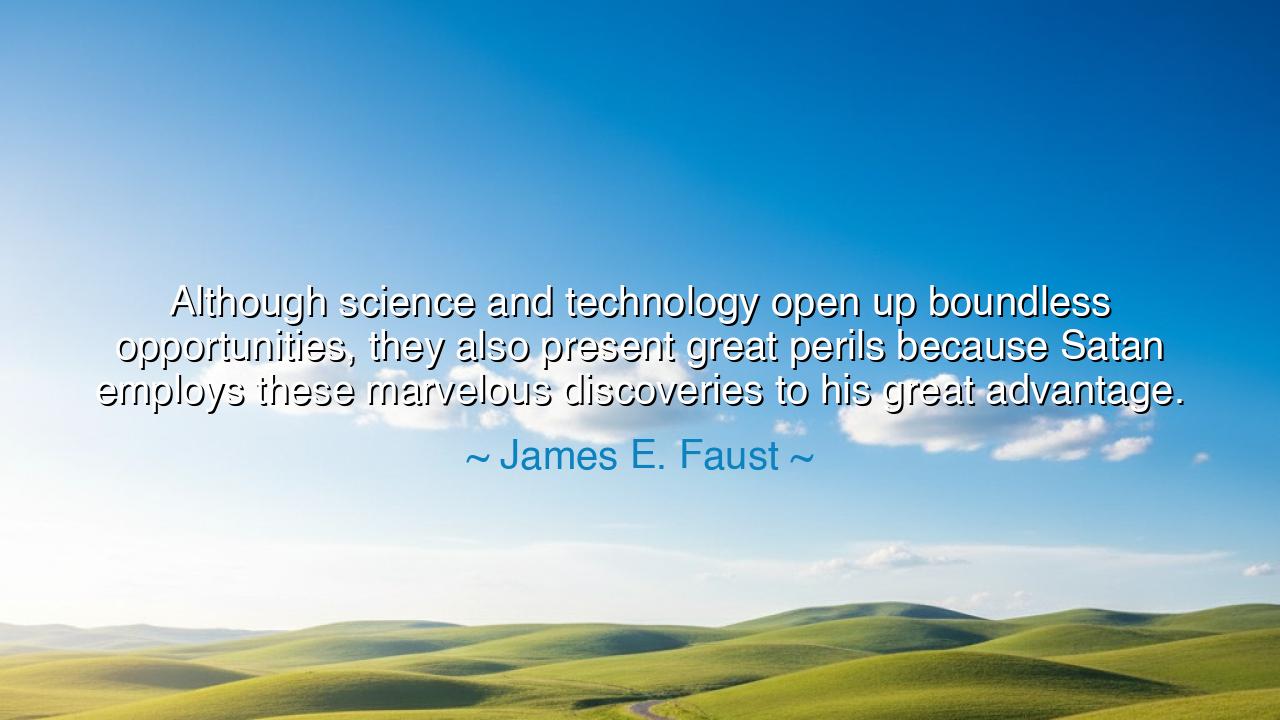
Although science and technology open up boundless opportunities
Although science and technology open up boundless opportunities, they also present great perils because Satan employs these marvelous discoveries to his great advantage.






Hear now, O children of wisdom, for I bring forth the words of James E. Faust, who speaks with clarity and foresight about the dual-edged nature of science and technology. “Although science and technology open up boundless opportunities, they also present great perils because Satan employs these marvelous discoveries to his great advantage.” These words, though spoken in a modern age, carry with them the timeless warning that the gifts of knowledge and progress—while capable of elevating humanity—are also fraught with dangers. Faust reminds us that the very forces which drive us toward enlightenment and innovation can also be twisted and used against us by darkness.
In the ancient world, the gods themselves were the gatekeepers of knowledge and power. Prometheus, that Titan who defied the gods to bring fire to humanity, gifted mankind with the power to shape their world. But in doing so, he also unleashed the potential for hubris, for destruction. The ancients understood that with great power came great responsibility, and that to tamper with the forces of nature could bring about both creation and chaos. Faust’s words echo this ancient truth: the discoveries of science and technology—though wondrous and life-changing—are not inherently good or evil. It is how they are used that determines their ultimate impact on the world.
The great story of Dr. Jekyll and Mr. Hyde, a tale by Robert Louis Stevenson, encapsulates this very dilemma. In the story, Dr. Jekyll, a brilliant scientist, creates a potion that allows him to separate his good nature from his darker impulses. What begins as a noble pursuit of self-control quickly devolves into chaos as his darker side, Mr. Hyde, takes control. This tale, though fictional, is a timeless reminder of how the pursuit of knowledge and power can bring about unintended consequences. Jekyll’s discovery, much like the advances in science and technology, could have been used for great good but was ultimately twisted by the forces of darkness within him. Similarly, Faust warns that the same tools of progress can be used by forces of evil, leading to destruction rather than enlightenment.
Science and technology, like the fire Prometheus brought to mankind, have revolutionized the world. They have cured diseases, extended lives, and allowed us to peer into the very fabric of the universe. But in the hands of those who seek power for selfish purposes, these same advancements can be turned to darker ends. Consider the invention of the atomic bomb during the 20th century. The discovery of nuclear fission held the promise of limitless energy, yet it was twisted into a weapon of unimaginable destruction. The atomic age was born from the same scientific principles that give us medical advancements and space exploration, yet it also brought the threat of total annihilation. The potential for good is vast, but so too is the potential for harm when knowledge is wielded without wisdom.
Faust’s words draw our attention to this moral dilemma: the discoveries of science are not neutral. They are tools, and like all tools, they can be used for both creation and destruction. The greatest scientists and innovators, from Newton to Einstein, were driven by a desire to understand and improve the human condition. But the very knowledge they sought to use for good has, in some cases, been misappropriated for darker purposes. It is a challenge that has faced humanity throughout the ages: how to harness power without succumbing to the temptations that come with it.
The lesson here, O children, is one of responsibility and vigilance. Just as science and technology offer us boundless opportunities to uplift humanity, they also carry with them the potential to lead us astray. The forces of darkness that Faust speaks of are not merely external threats; they are within us as well. Greed, pride, and selfishness can twist even the most noble of inventions into instruments of harm. It is not enough to create and discover; we must also guard our hearts and our minds, ensuring that the power we wield is used for the good of all, not for our own gain.
In your own lives, O children of the earth, seek knowledge and pursue progress, but always with humility and wisdom. Understand that science is a gift, but it is also a burden. The power it gives must be tempered with the understanding that knowledge without ethics is dangerous. Whether you are working with the advances of today or dreaming of the innovations of tomorrow, remember that the tools of creation can also be tools of destruction. Strive to use the knowledge you gain to serve the greater good, to uplift humanity, and to promote peace and justice.
Faust’s warning is not one of despair but of awareness. As we move forward in this age of rapid advancement, let us do so with the understanding that every step toward progress brings with it both great potential and great peril. Just as the great scientists of the past have illuminated the path of human progress, so too must we be mindful of the shadow that follows. Let wisdom guide your use of the tools of science, and may you always remember that with great knowledge comes the responsibility to use it for good—to safeguard the world from the forces that seek to turn it toward destruction.






AAdministratorAdministrator
Welcome, honored guests. Please leave a comment, we will respond soon